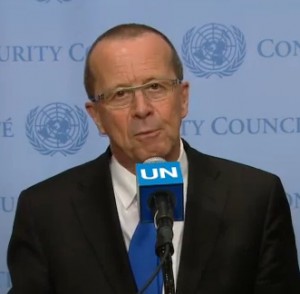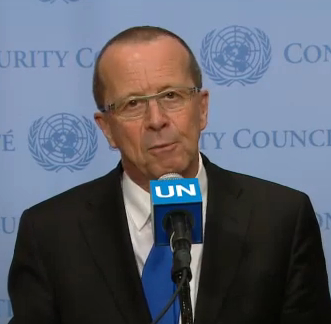By Libya Herald reporters.

Tunis, 2 March 2016:
The peace process, desired by most Libyans is being stymied by a few selfish political . . .[restrict]actors who now had to be told that enough was enough, UNSMIL chief Martin Kobler reported to the UN Security Council in New York today.
“Both in eastern and western Libya” said Kobler, “there are those who are committed to do everything in their power to undermine the political process, as well as the formation of a Government of National Accord and its instalment in the capital”.
He continued: “These actors must be told in no uncertain terms that enough is enough. It is hight time that they stand by the interests of the Libyan people, not against them”.
Kobler said that the House of Representatives had accepted the Libyan Political Accord in principle. However, he did not refer to the key sticking point, supplementary Article 8 which stipulates that the control of all senior military, civil and security posts would be transferred to the Presidency Council.
He also said the HoR was ready to back the Government of National Accord. At its insistence, the Presidency Council had produced a second, smaller cabinet that that parliament was on the verge of approving it when its session was interrupted by a minority of members who opposed the vote. These individuals, he said, had resorted to threats and intimidation preventing the majority from voting freely. He noted that despite this, one hundred members, constituting a majority, had signed a statement endorsing the new government and its programme.
“I am convinced that a positive vote could have taken place on 22 February,” he said, “had the leadership of the House of Representatives shown the resolve and determination to put the Government of National Accord to a vote”.
He had therefore been in touch with HoR president Ageela Saleh insisting he register the majority view and endorse the GNA .
Kobler warned that if the new government was not recognised by early next week, in line with the Libyan Political Agreement he intended to reconvene the Libyan Political Dialogue to look for another way of tackling the issue. He gave no indication of possible solutions. As the duly-elected parliament, the HOR’s role is central to LPA.
Kobler repeated that there were no alternatives to the LPA. The Government of National Accord should be allowed to take up its duties in Tripoli as soon as possible. He noted that the Presidency Council had set up a security committee to oversee the safe relocation of the new government to the capital but admitted that, with few exceptions, even he and fellow members of UNSMIL had repeatedly been denied permission to land or even overfly Libya Dawn-controlled areas.
Kobler explained to the UN Security Council that he planned to broaden the support for the LPA by going back to municipal and tribal leaders. He said he also wanted to be engaging civil society organisations and groups representing women, of whom he regretted, too few had been admitted to the political process.
This would be a revival of the different negotiating streams initiated by his predecessor Bernardino Leon. At that time, elected local councillors were praised as having a clear democratic mandate. There had even been proposal, later abandoned, that a National Municipalities body be established to shadow a new government. Leon’s attempts to bring tribal leaders on board were less successful. One meeting in Cairo had to be abandoned because of violent disagreements.
Kobler floated the idea today of a nation-wide “Grand Shura” though he did not specify if it might have a short-term role in getting the LPA working or longer-term function once the new government has started work. Under December’s political agreement signed in the Moroccan resort of Skirhat, the key consultative role rests with the State Council, drawn largely from members originally elected to the General National Congress. Kobler said that he welcome the preliminary meetings of the State Council and said he was looking forward to its first official meeting in Tripoli as soon as possible.
Kobler said that it was with a heavy heart that humanitarian problems had increased against the background of a poor financial response from the international community. He repeated recent UN findings that 2.4 million people in Libya needed some sort of help including a million children at risk from not being inoculated and 1.3 million people who didn’t have enough to eat. He said that more than 40 percent of health facilities were not working. A resolution to the political impasse was therefore imperative.
“The overwhelming majority of the Libyan people are in favour of the Libyan Political Agreement. The overwhelming majority support the formation of a Government of National Accord that effectively addresses the existing threats and the overwhelming majority want and deserve peace – now”
He added: “Some of those politically responsible on both sides, however, still refuse to listen to the voices of the Libyan people and [continue to] pursue their own narrow political interests”. [/restrict]






